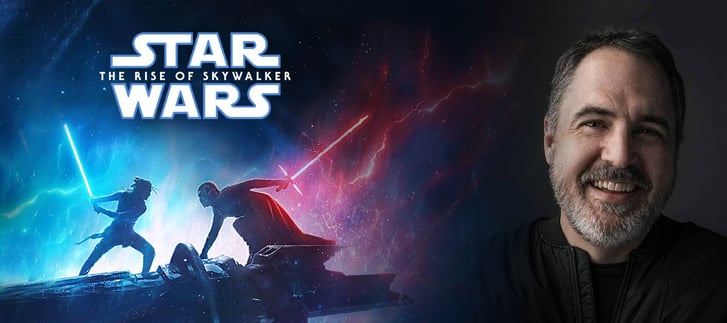 We interviewed David Acord, a Supervising Sound Editor, Sound Designer, and Re-recording Mixer for Skywalker Sound. Acord has dozens of credits and was nominated for two Academy Awards: Star Wars: The Force Awakens in 2016, and the recently released Star Wars: The Rise of Skywalker. He has also been a Sound Particles user for quite some time.
We interviewed David Acord, a Supervising Sound Editor, Sound Designer, and Re-recording Mixer for Skywalker Sound. Acord has dozens of credits and was nominated for two Academy Awards: Star Wars: The Force Awakens in 2016, and the recently released Star Wars: The Rise of Skywalker. He has also been a Sound Particles user for quite some time.
How did your interest in sound start, and how did it end up becoming a profession?
My interest in sound started with music. I was a musician, for the age of 9, I've been playing various instruments. I was in high school and college bands. In college, we would make analog multitrack recordings. I think this was the germ of my professional sound career. While working in special effects on 12 Monkeys in 1994, I met sound mixer, Jay Meagher. We hit it off talking about gear, film sound, etc. Anyway, Jay was gracious enough to hire me on to his next several projects as a member of his production sound team. That was the beginning of my film sound career.
How important was it to start in production work (boom, mixer, cable) before going into the studios as an assistant sound editor?
Despite my own beginning as a production sound person, I don’t believe it is necessary for editors to begin there. Yes, you would certainly gain a more nuanced perspective on editorial (particularly dialog) if you worked even one production gig. However, I don’t think the two disciplines are mutually required experiences.
Looking back to your career, it seems to us that you had to work hard to become the professional you are today. Which advice do you want to leave for younger generations of aspiring sound professionals?
Probably the most common question I am asked is “how does one become a successful sound professional?” The answer is “I don’t know.” Like most film jobs, there is no clear or direct path to employment, let alone success. This may be a little discouraging to hear. However, I firmly believe that hard work, a good attitude, and a team-oriented spirit will carry you a long way. That last point is especially important: be a team player. Be a collaborator.
Designing voice is always tricky. How do you usually approach voice creation?
The most important thing to remember in either voice creation or voice manipulation is that you are communicating with the Audience. A manipulated [voice] should either be intelligible or at least be able to convey a clear emotion. The same goes for a generated vocal, the important thing is emoting. Even if there is no clear language, the emotional intent needs to be clear.
Regarding Sound Particles, can you give us an example of its use in Star Wars?
[SPOILER ALERT] I have used Sound Particles a number of times in the past. In Star Wars: The Rise of Skywalker, I used Sound Particles to help create electrical storm elements for Palpatine’s Force lightning. Also, when Palpatine is life-draining Rey and Ren, I used Sound Particles to help with the swirling “soul scream” torrent sounds draining from their bodies.
Star Wars: Episode IX - The Rise of Skywalker is in theaters now, and the winners of the Academy Awards will be announced Sunday, February 9th.
Topics: Sound Particles, Sound Design, Interviews, Star Wars